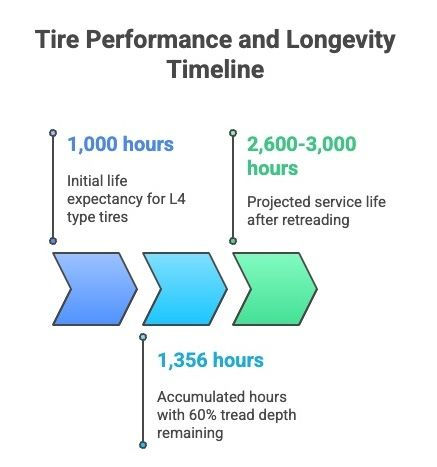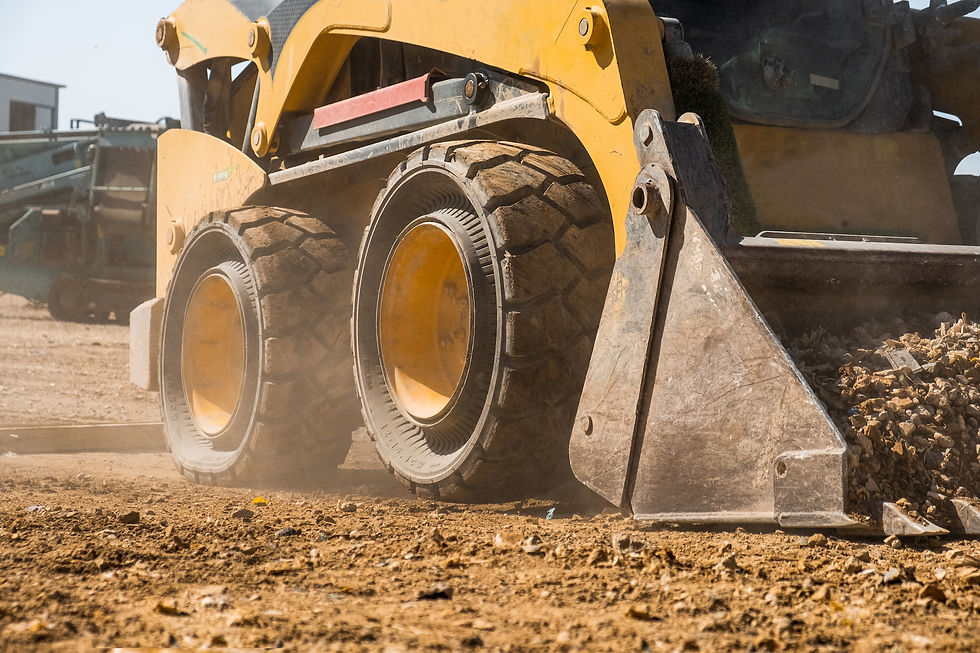Why Galileo Airless Skid Steer Tires Actually Last 2-3x Longer Than Conventional Rubber
- Galileo Wheel

- Jul 15, 2025
- 6 min read
Walk into any construction yard and you'll hear the same complaints: "These tires keep going flat," or "I'm replacing rubber every few months and it's killing my budget." The problem isn't bad luck or poor driving – it's that conventional pneumatic tires simply weren't designed for the punishment modern skid steers dish out daily.
We've heard these stories for years. That's exactly why Galileo Wheel doesn't just engineer airless tires – we test them in the real world, under the same brutal conditions that destroy conventional rubber. Not in some climate-controlled lab, but in actual demolition sites, recycling facilities, and construction zones where tires go to die.
The results? Our airless skid steer tires consistently deliver 2.5-3x times the service life of conventional pneumatic tires, with zero downtime. Here's the data that proves it.
Why Most Skid Steer Tire Testing Misses the Point
Most tire companies test in controlled environments with predictable surfaces and ideal conditions. That's fine for marketing brochures, but it tells you nothing about how tires perform when your skid steer is working in a scrap yard full of twisted metal or pushing through a demolition site loaded with rebar chunks.
Real-world skid steer operations don't happen on smooth concrete pads. They happen in four distinct environments, each with its own way of destroying tires:
Extreme: Waste recycling facilities operating 8-10 hours daily, where tires encounter concrete surfaces with aggressive leachates and high concentrations of sharp metal parts
Severe: Demolition sites running 6-8 hours daily, featuring concrete or hard soil surfaces with significant presence of sharp metal parts
Mild: Construction sites on hard soil with up to 5 daily operating hours and minimal exposure to sharp metal parts
Soft: Construction operations on soft soil, with up to 5 daily operating hours and minimal exposure to sharp metal parts and debris
Your operation probably fits into one of these categories. The question is: will your tires survive what you throw at them day after day?
The Real-World Test: Severe Conditions That Destroy Conventional Skid Steer Tires
To validate performance across this spectrum, Galileo Wheel initiated comprehensive field tests spanning three countries. We didn't cherry-pick easy applications – we went straight to the environments that eat tires alive.
Our testing program deployed multiple skid steer models including GEHL V270 and V330, Bobcat S66, G853, and S630, and John Deere 324G. Every test site was chosen specifically because conventional tires struggle there.
Construction Material Recycling Operation - The 364-Day Marathon
The Setup:
Equipment: GEHL V270
Conditions: SEVERE classification
Daily punishment: Hard soil, concrete surfaces, high concentration of sharp metal parts
Operating schedule: 6-8 hours daily
Conventional L4 tire expectancy: 1,000 motor hours

The Results After 364 Days:
Accumulated hours: 1,356 (35% beyond L4 tire expectancy)
Remaining tread depth: 60%
Downtime from tire failures: Zero
Tire structure condition: Undamaged and ready for retreading
Projected total service life: 2,600-3,000 hours
Let that sink in. While conventional tires were expected to fail at 1,000 hours, our airless tires hit 1,356 hours and were only 40% worn. The math is simple: 160-200% longer service life with zero unexpected failures.
But severe conditions weren't enough. We pushed further.
Extreme Conditions: Where "Impossible" Becomes Routine
Some job sites don't just challenge tires – they actively try to destroy them. Waste recycling facilities represent the absolute worst-case scenario: concrete surfaces soaked with corrosive chemicals, metal debris everywhere, and 8-10 hours of daily punishment that would kill conventional tires in weeks.
Waste Recycling Facility - The Ultimate Endurance Test
The Challenge:
Equipment: GEHL V330
Conditions: EXTREME classification
Daily exposure: Concrete surfaces with aggressive pH leachates, sharp metal debris
Operating schedule: 8-10 hours daily
Standard tread compound expectancy: 300 motor hours

Results After 112 Days:
Achieved hours: 368 (22% beyond expected service life)
Failures: Zero
Tire structure: Completely undamaged despite chemical exposure
Performance: Completed full service cycle ready for retreading
Bonus discovery: In softer ground conditions, the same tire design showed minimal tread wear (less than 1.0 mm) at similar hours
Even in conditions that typically destroy tires in 300 hours, Galileo airless tires delivered consistent performance with zero downtime. The aggressive chemicals that eat through conventional rubber sidewalls? Our innovative airless design laughed them off.
The Hidden Costs of Conventional Tire Failures
The hour count tells only part of the story. Every conventional tire failure costs you more than replacement rubber:
Direct Costs:
New tire purchase
Installation labor
Emergency service calls
Hidden Costs:
Machine downtime while waiting for tire service
Operator downtime and rescheduling
Lost productivity from unexpected stops
Potential safety incidents from sudden tire failures
Opportunity Costs:
Jobs delayed or incomplete
Customer satisfaction issues
Reputation damage from unreliable equipment
In our field tests, Galileo airless tires eliminated every one of these hidden costs. Zero unexpected failures means zero surprise downtime. Your schedule stays intact, your operators stay productive, and your customers stay happy.
Why Airless Design Changes Everything
Conventional pneumatic tires fail because they're fundamentally vulnerable. Air pressure creates weak points. Sidewalls puncture. Valve stems leak. Rim damage causes blowouts.
Sharp debris that would barely scratch an airless tire can completely disable a pneumatic tire. Our airless design eliminates these failure modes entirely:
No Air Pressure = No Pressure-Related Failures No flats, no leaks, no pressure monitoring, no emergency air compressor runs.
Reinforced Structure = Cut Resistance Our tire structure is designed to absorb cuts and impacts that would destroy conventional sidewalls.
Self-Supporting Design = Consistent Performance Performance doesn't degrade as air pressure drops because there's no air pressure to drop.
Ready for Retreading = Extended Total Life When the tread finally wears down, the tire structure remains intact and ready for professional retreading.
The Math That Matters: Total Cost of Ownership
Smart operators don't buy tires – they buy uptime. Here's how the numbers work when you factor in the complete picture:
Conventional L4 Tire Scenario (Severe Conditions):
Expected life: 1,000 hours
Replacement cycles over 3,000 hours: 3 complete sets
Unplanned downtime incidents: 3-6 failures
Total cost: Purchase price × 3 + downtime costs + emergency service
Galileo Airless Tire Scenario (Same Conditions):
Projected life: 2,600-3,000 hours
Replacement cycles over 3,000 hours: 1 set + 1 retread
Unplanned downtime incidents: Zero
Total cost: Purchase price + retread cost
The longer service life is just the beginning. Eliminating downtime and emergency service calls often saves more money than the extended tire life itself.
Choosing the Right Test Environment for Your Operation
Not every operation faces extreme or severe conditions, and that's fine. The key is understanding where your operation fits and choosing tires tested in similar environments.
Your Operation Is Probably "Severe" If:
You regularly encounter metal debris, rebar, or construction waste
Your surfaces include concrete, asphalt, or hard-packed soil
Operating hours exceed 6 per day
Tire failures happen multiple times per year
Your Operation Is Probably "Extreme" If:
Chemical exposure is routine (waste facilities, recycling operations)
Sharp metal debris is everywhere
Operating hours exceed 8 per day
Conventional tires fail in weeks or months, not years
Your Operation Might Be "Mild" or "Soft" If:
Clean construction sites with minimal debris
Primarily soft soil surfaces
Operating hours under 5 per day
Conventional tires last close to their rated life
Even in mild conditions, our field tests show significant advantages in reliability and total service life. The question isn't whether airless tires will outperform – it's by how much.
The Real Decision: Proven Performance vs. Promises
Most tire decisions get made on price, brand recognition, or availability. Smart operators make decisions based on proven field performance under conditions that match their actual work environment.
Galileo Wheel airless skid steer tires aren't just engineered differently – they're tested differently. While some other manufacturers tout lab results and theoretical advantages, we provide real-world data from the environments that destroy conventional tires.
Our field tests prove what we've always known: when you eliminate the fundamental weaknesses of pneumatic tire design, everything changes. Reliability becomes predictable. Downtime becomes optional. Tire budgets become manageable.
The bottom line: There's no such thing as the "best" skid steer tire – only the right tire for your specific application, backed by field data that proves it will perform as promised.
Choose based on where you actually work. Choose based on proven field results, not laboratory theories. Choose tires that have already survived the conditions that would destroy your current ones.
Quality confirmed by practice. Performance proven in the field.
Ready to experience the difference for yourself? If you want to order your set of Galileo Airless Skid Steer Tires or learn more about how they can transform your operation, call us at 1-888-280-0851 or contact at info@galileowheel.com to speak with our tire specialists about your specific application.




Comments